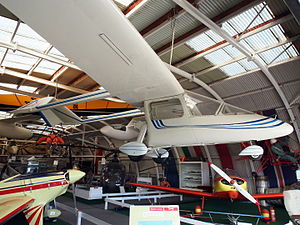| LO 120 S | |
|---|---|

| |
| Role | Motor gliderType of aircraft |
| National origin | Germany |
| Manufacturer | LO-Fluggerätebau |
| Status | Production completed |
| Variants | LTD LO-120S |
The LO 120 S is a German parasol-wing, pusher configuration, open-cockpit, two-seats in tandem motor glider that was designed and produced by LO-Fluggerätebau. When it was available it was supplied as a kit for amateur construction and meets European microlight rules.
Design and development
The LO 120 S is of unusual design. The fuselage resembles that of an ultralight trike, but instead of a hang glider flexible wing, it mounts a rigid, straight wing with a span of 14.94 m (49 ft) in the motor glider role, with optional shorter wings for powered cross country flying. Unlike conventional trikes, the aircraft has a tail, of twin-boom configuration with an inverted v-tail. Later models enclosed and faired the cockpit into the wing, making it a high-wing aircraft.
The LO 120 S is of mixed construction, using plywood, metal and composite materials. The specified engine is the Hirth 2704 of 30 kW (40 hp) mounted behind the cockpit as a pusher powerplant. The landing gear is tricycle gear.
Specifications (LO 120 S)
Data from Purdy
General characteristics
- Crew: one
- Capacity: one passenger
- Wingspan: 14.94 m (49.00 ft)
- Empty weight: 200 kg (441 lb)
- Gross weight: 400 kg (882 lb)
- Powerplant: 1 × Hirth 2704 , 30 kW (40 hp)
- Propellers: 3-bladed wooden
Performance
- Maximum speed: 150 km/h (93 mph, 81 kn)
- Cruise speed: 119 km/h (74 mph, 64 kn)
- Range: 600 km (373 mi, 324 nmi)
- Rate of climb: 3.5 m/s (680 ft/min)
See also
References
- ^ Purdy, Don: AeroCrafter - Homebuilt Aircraft Sourcebook, page 308. BAI Communications, July 1998. ISBN 0-9636409-4-1
External links
| Alfred Vogt aircraft | |
|---|---|
| Aircraft | |